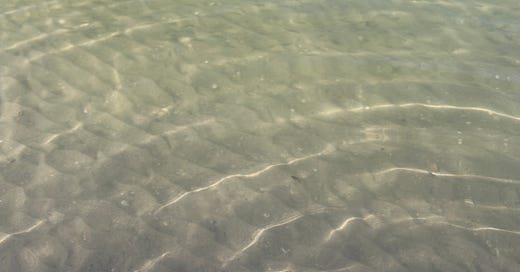Mark 4:35-40 (Common English Translation)
Later that day, when evening came, Jesus said to them, "Let's cross over to the other side of the lake." They left the crowd and took him in the boat just as he was. Other boats followed along.
Gale-force winds arose, and waves crashed against the boat so that the boat was swamped. But Jesus was in the rear of the boat, sleeping on a pillow. They woke him up and said, "Teacher, don't you care that we're drowning?"
He got up and gave orders to the wind, and he said to the lake, "Silence! Be still!" The wind settled down, and there was a great calm. Jesus asked them, "Why are you frightened? Don't you have faith yet?"
Because of our habit of relating to the disciples, we place ourselves alongside them in the boat, panicking. I thought of this story from Mark this week and pictured myself finding anything I could to bail water from the swamped boat. Then, I had to make sure I used the term "bail" properly since I have zero seafaring experience, and an internet search swept me away into the deep waters. I came across an article from Boatingmag.com titled, "Tips for Bailing Water From Your Boat: How to bail water from your boat as swiftly as possible in big seas." (Jim Hendricks, June 5, 2023) The beginning felt straight out of the Gospel story:
Seas grew mean as we neared the end of the 25-mile down-sea run while returning from Southern California's Catalina Island and approached the entrance to San Pedro's outer harbor aboard my 21-foot center-console.
Almost without warning, an immense and unavoidable trough loomed ahead as we crested the back side of a big roller. The boat plunged down the face of the wave and into the hole, burying the bow into the back of the wave ahead, shipping aboard an alarming amount of green water.
The precautions I had taken and my next moves would prove crucial in protecting the crew and saving the boat. Here are the lessons that can be learned from this experience. (Link to article: https://www.boatingmag.com/how-to/tips-for-bailing-water-from-your-boat/ )
We humans naturally panic when we suddenly find ourselves on a sinking ship. The waters roil and churn, scary creatures that inspired mythology lurk in the deep waters, and once the ship goes down, we may or may not find something to hold fast to and keep afloat. With good reason, we use "sinking ship" to convey desperation or resignation when faced with a failing endeavor.
But the disciples didn’t need to fear as water overtook their boat, right? Jesus napped aboard and would not let the ship sink and allow his friends to perish…right? Surely, the Son of God would save them all with the greatest of ease. They did not need to run around in horror. The swamped ship amounted to little more than an inconvenience, fodder for a good story one day. The disciples overreacted, forcing Jesus to step in, calm the seas, and then turn and chastise them for their lack of faith.
No. Not really. We often hear the story this way, either as we read it or as preachers interpret it from the pulpit. Jesus needed sleep after preaching a long sermon by the water about the kingdom of God, which included the parables of the sower, the lampstand, and the mustard seed. He had delivered some of his best work and rightfully needed time to restore and rest. Rudely, the disciples grew unreasonably fearful during a storm and woke the napping Jesus, who then must still the waves and rebuke the disciples. If only the disciples believed more and had faith built on witnessing the works of Jesus, then they would not have unnecessarily bothered the messiah with their weakness. Lesson: Don't be afraid, like the disciples, even in the face of the most terrifying events. Instead, believe and remain calm.
But that's not life, and that's not human. There is a reason we often hear "Do not be afraid" in the Bible. Life is terrifying. And spiritual life? Even more frightening! Any human could reasonably expect to experience a flood of fear when suddenly finding themself standing before an angel. Unexpectedly hearing the voice of God should leave a person shaking. The disciples understandably grow frustrated with Jesus's apparent apathy as they watched the deep waters overtake their boat. They exhibited a normal and human response to the true horror befalling them, something Jesus might not have understood.
We believe in the full divinity and full humanity of Jesus of Nazareth, the Christ. In this one person, divine and human collided in a way that did not diminish either nature. However, I see times in the Gospel narratives when Jesus's humanity got in the way of his divinity and, indeed, when his divinity got in the way of his humanity. Hebrews 4:15 explains, "because we don't have a high priest who can't sympathize with our weaknesses but instead one who was tempted in every way that we are, except without sin." I believe that, but I also wonder how Jesus could fully understand human temptations if he never fell victim to them. I read the stories and find moments when Jesus struggled to understand the humanity of those he ministered to.
When he looks at the disciples and says, "Why are you frightened? Do you not have faith yet?" we hear a rebuke, but maybe Jesus asked the questions in earnest. Perhaps, in rousing him from his sleep to save them from the storm, the disciples woke him up to their human reality. A storm means nothing to a god, but to a human, it can mean death - in the case of drowning, a horrible one. To be afraid is to be human in this scenario. They rightfully panicked and rushed to beg his intervention.
As Christians, we focus on the many lessons Christ taught his disciples, and they passed on to us - important, valuable, and beautifully conveyed lessons. But what of the times they taught him during his earthly pilgrimage? Mark includes the story of the Syrophoenician Woman (Mark 7:24-30), one of my favorites, in which Jesus essentially calls the woman a dog, and she rejoins, "Even the dogs under the table eat the children's crumbs." Mark shows us a Jesus struggling to balance his divinity and humanity, with some of the lowest humans teaching and guiding him along the way.
We, too, struggle to balance the many perspectives of our lives, to say nothing of entertaining the ones that don't belong to us. In my daily routine, my vision narrows to my roles and identities. Some moments, I look at the world as a farmer, a preacher, and others as a mother, writer, or friend. I cannot look at the world as a Black woman, a gay man, a conservative Evangelical, or a LatinX immigrant. I do not have the perspective of a Sudanese mother struggling to protect her children, a Palestinian father moving his family from encampment to encampment, nor an Israeli family fearful of their future when remembering their long and painful past. I need people to break into my slumber and wake me to their realities.
We all do. We need moments that shake us and force us to see the world in different ways. Our humanity demands we crash into others, often wholly unlike ourselves, to teach us compassion, feed our hunger for God's justice, and work for fairness. Mark's Jesus struggled to balance his divinity with his humanity. We, mere mortals, struggle to balance the many facets of our humanity. The easy way keeps us slumbering in the narrow view in the back of our personal boat of perspective. But the seas roll beyond, and others cry out for something to bail water from their sinking ship. We may not be able to calm the storms, but that also means we cannot rebuke others for being afraid.
I need to witness Jesus's capacity to learn and grow as a part of his humanity. I need to see his need, to watch as he awakens to another's reality, and, in so doing, learn more about mine. I want to know that he had to learn and evolve. It helps me understand grace more fully and the patience of God in watching me make mistakes, stumble, fall asleep, and fail. I learn to learn by watching Jesus do the same and forgive myself for my ignorance and blindness. Afterall, I am only wholly human and a creature of comfort but also built to learn and evolve.












Share this post